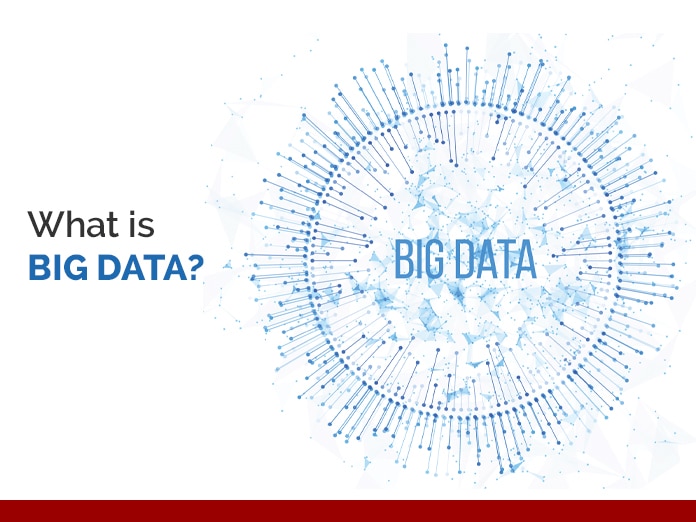Hi Everyone,
In today’s blog, we discuss data science. In particular, the big data part of data science.
Big data is a term that describes very large or complex data sets involving both structured and unstructured data. The data is collected from a variety of sources including mobile devices, mobile apps, emails, servers, databases, and many other means. When formatted, captured, processed, manipulated, and then analyzed, this data will help a business gain insight, maintain or get clients, increase revenue and enhance operations.
Jump to Section
What Is Big Data?
Big data is defined as the name says, in brief, the massive volume of both structured and unstructured data. Mainly, that is so large and difficult to process using traditional database and software techniques.
For the most part, big data characteristics consist of five V’s, which include volume, velocity, variety, veracity, and value, which makes big data a huge business.
What Type of Data Is Big Data?
- Big data refers to the data gathered from multiple sources, which include structured, unstructured, and semi-structured data.
- While, for the data in the past, usually, data could only be collected from spreadsheets and databases.
Big Data Features
- Big data analysis demand cost-effective, innovative forms of information processing for enhanced insight and decision making.
- It includes the process of data mining, data storage, data analysis, data sharing, and data visualization.
- One of the most significant advantages of big data is predictive analysis with the most accuracy.
- In conclusion, big data analytics helps companies generate more sales leads. It would naturally mean a boost in revenue.
- In short, with big data insights, you can always stay a step ahead of your competitors.
Big Data Tools
Namely, the tools for big data are as follows:
- Hadoop
- Apache Spark
- Apache Storm
- Cassandra
- RapidMiner
- MongoDB
- R Programming Tool
- Neo4j
- Apache SAMOA
- High-Performance Computing Cluster (HPCC)
The use and working of some tools are given below:
-
Hadoop: Hadoop has enormous capability of large-scale processing data. It can run on a cloud infrastructure. It is a open source framework.
-
Apache Spark: Apache spark fills the gaps of Apache Hadoop concerning data processing. It handle both batch data and real-time data. Apache Spark processes data much faster than the traditional disk processing.
-
R Programming Tool: R is used for statistical analysis. R has its own public library Comprehensive R Archive Network (CRAN). CRAN consists of more than 9000 modules and algorithms for statistical data analysis.
-
High-Performance Computing Cluster (HPCC): HPCC helps in parallel data processing. HPCC includes binary packages supported for Linux distributions. It maintains code and data encapsulation.
Big Data Analysis Techniques
- Association rule learning: It is a method for discovering interesting correlations between variables in large databases.
- Classification tree analysis: It is the method of identifying categories that a new observation belongs to.
- Genetic algorithms: Though, algorithms that are inspired in such a way evolution works, that is, adopting mechanisms such as inheritance, mutation, and natural selection.
- Machine learning: Machine learning includes software that can learn from data.
- Regression analysis: Data Analysis involves manipulating some independent variables to see how it influences a dependent variable.
- Sentiment analysis: Data Analysis helps researchers, though with determining the sentiments of speakers or writers with respect to a topic.
- Social network analysis: It is a technique that was first used in the telecommunications industry, and then quickly adopted by sociologists to study interpersonal relationships.
The Big Data Analysis Challenges
- Getting data into a big data structure.
- Syncing across data sources.
- Conversely, extracting information from the data in big data integration.
- Last, miscellaneous challenges. For instance, integration of data, skill availability, solution cost, the volume of data, the rate of transformation of data, veracity, and validity of data.
- Dealing with data growth, as the quantity of data is increasing with time.
Big Data Analysis Usage
Various industries use big data analytics given as following:
- Health care: By using predictive analytics, medical professionals and healthcare practitioners provide personalized healthcare services to individual patients.
- Academia: Big data is providing the opportunity and helping enhance the education system today.
- Banking: The banking sector relies on big data for fraud detection in real-time such as misuse of credit/debit cards, archival of inspection tracks, faulty alteration in customer stats, etc.
- Manufacturing: It helps in manufacturing industries to improve the supply strategies and product quality.
- IT: Companies around the globe are using big data to optimize their work functioning, enhance employee productivity, and minimizing the risks in business operations.
Future Scope of Big Data as in Career Choice
- High demand for data analytics professionals.
- Huge job opportunities around the globe.
- The salary aspects are high.
- After all, big data analytics is being a top priority in a lot of organizations.
- It provides the key factor in decision making.
- The adoption of big data analytics in industries is growing.
- Outstanding the market forecast and predictions for big data analytics.
- In conclusion, big data analytics is being used everywhere.
Conclusion
Therefore, the availability of big data in the industry, with the low-cost commodity hardware, and therefore, new information management, together with, analytic software, has produced a unique moment in the history of data analysis.
In short, the age of big data is here, and these are truly revolutionary times.
So, in case you need any consultancy regarding data analytics you can get in touch with us at https://www.loginworks.com/web-scraping-services.
We serve our clients with quality work and as per their satisfaction.
Please feel free to share your feedback and opinion about this blog. We hope you enjoyed this post. It would be very great if you could share it with your friends or share it on social sites. Thank you!
- Business Intelligence Vs Data Analytics: What’s the Difference? - December 10, 2020
- Effective Ways Data Analytics Helps Improve Business Growth - July 28, 2020
- How the Automotive Industry is Benefitting From Web Scraping - July 23, 2020


